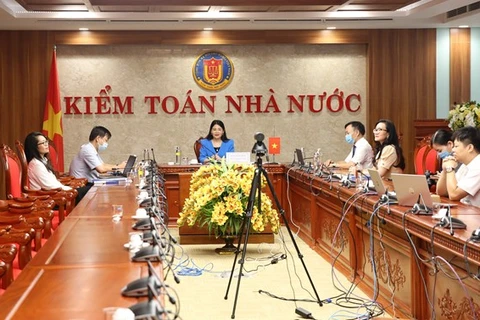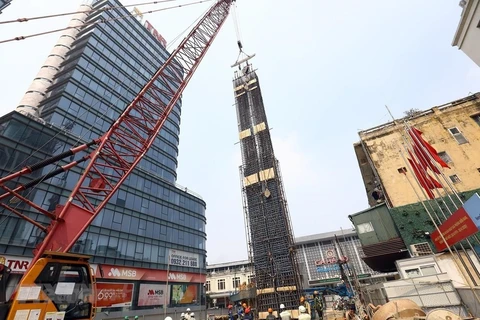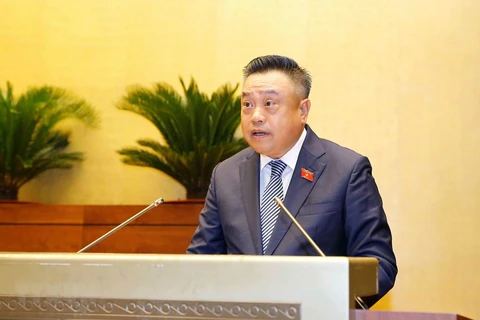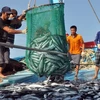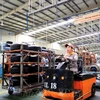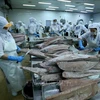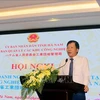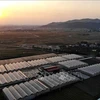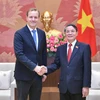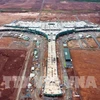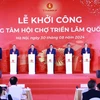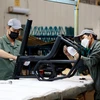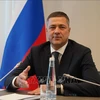 National Assembly Chairman Vuong Dinh Hue speaks at the working session with the State Audit Office of Vietnam. (Photo: VNA)
National Assembly Chairman Vuong Dinh Hue speaks at the working session with the State Audit Office of Vietnam. (Photo: VNA) The SAV needs to soon draw up a plan to implement the State audit strategy by 2030 and continuously enhance transparency and professionalism in its activities, he said.
The top legislator also urged the SAV to review the enforcement of the law amending and supplementing some articles of the State Audit Law recently approved by the legislature, especial stipulations relating to its functions and tasks.
The focus of the year 2022 will be on supreme supervision of thrift practice and anti-wastefulness, he said, requesting the agency to pay due heed to fiscal, monetary and trade policies.
The leader lauded the SAV’s role in fostering thrift practice and anti-wastefulness, and the effective use of public assets and funding since its inception 27 years ago.
Auditor General Tran Sy Thanh reported that so far this year, the SAV has completed 91 audits and proposed financial measures related to 50.87 trillion VND (2.23 billion USD), including collecting an additional 6.65 trillion VND to the State budget and reducing budget spending by 5.79 trillion VND.
The agency also proposed scrapping, amending, supplementing and issuing 67 legal documents, helping to deal with loopholes in mechanisms and policies to prevent losses and wastefulness, he said.
The SAV is serving as Chair of the ASEAN Supreme Audit Institutions (ASEANSAI) Strategic Planning Committee and Chair of the Asian Organisation of Supreme Audit Institutions (ASOSAI) in the 2018 - 2021 term.
The ASOSAI was founded in 1979 and pursues a mission common among working groups of the International Organisations of Supreme Audit Institutions (INTOSAI), that “Professional supreme audit institutions promote good State governance”, and with the core values of “Professionalism, Cooperation, Equality, Creativity”.
Its goal is to promote mutual understanding and cooperation among member SAIs through the exchange of ideas and experience in public auditing, creating the conditions necessary for the training of State auditors to improve working quality and efficiency.
The SAV became a member of ASOSAI in 1997. In its initial period of membership, it primarily sent auditors to attend training courses and workshops sponsored by the ASOSAI, to enhance professional capacity. Since 2010, the SAV has undertaken a more active role in the association’s professional activities.
The SAV, as Chair of ASOSAI in the 2018 - 2021 term, has carried out a lot of important and effective audit activities which have gained praise from regional and international audit agencies.
Besides, it has also actively and responsibly participated in activities of the International Organisation of Supreme Audit Institutions (INTOSAI) as a representative of its Regional Working Group.
In an interview with the Vietnam News Agency earlier this year, then Auditor General Ho Duc Phoc said the SAV will continue promoting the sharing of experience and training among state audit institutes (SAIs), which is the top priority ASOSAI during its final year as ASOSAI Chair in 2021.
The move aims to help SAIs make a timely response to constant changes in the public financial management environment, he noted.
The SAV is currently working with the ASOSAI’s Capacity Development Committee (the Board of Audit of Japan) and its committees and working groups to share knowledge and good practice and bolster the role of the ASOSAI in supporting its members amid the COVID-19 pandemic, to build an organisation with professional and dynamic SAIs that are able to respond to challenges and emerging issues in the region and the world.
Regarding the audit of water resources in the Mekong River basin, Vietnam continued working with international experts to provide training and set up audit plans for SAIs in January - February. The SAIs will conduct independent audits in coordination with the SAV and with instructions from experts.
In the fourth quarter, the SAV will chair an international conference to share the results of the audit as well as good practice in environmental audits and the sustainable development goals, according to Phoc./.
VNA
